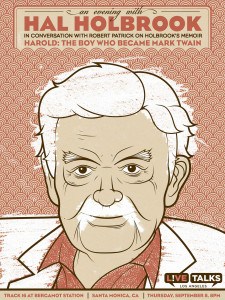Blog
Asking Questions at Public Events….
Some call it the ‘intelligence of the audience,’ yet sometimes it’s just not that. We refer to the Q&A session after public talks or lectures. At Live Talks Los Angeles, we look forward to them, as you never know what will come up, like the time on November 22nd, 2010, when we hosted Roger McGuinn of The Byrds. Being the anniversary of the Kennedy assassination, someone asked McGuinn to comment on his recollections of that day. Mcguinn started to speak, and then decided the music said more, so played the Byrds’ version of the song, He Was a Friend of Mine, with the song’s melody altered and the lyrics changed to lament the assassination of John F. Kennedy. Here’s the video (at 3:22). It was one of those moments at a public event.
Speaking of questions at public events, at Live Talks Los Angeles, we remind folks that questions are short and generally starts with a W or an H. In today’s NYT is a piece by Misha Glouberman on Q&As at public events that we liked. Here’s an excerpt:
‘How do I know if my question is a good question?’’
‘‘Good question,’’ I reply, setting them on a spiral of positive feedback. A good question is, by definition, a question. You cannot just take a statement and raise the pitch at the end. Sometimes people will say ‘‘Might it not be said that statement-statement-statement?’’ or ‘‘How would you respond were someone to say statement-statement- statement?’’ You can’t just take a statement and dress it up in a question’s clothes, like the Little Rascals dressing up as a grown-up to get into a movie.
Also, if there are grammarians in the audience, they will support me when I say that there is no such grammatical construct as a two-part question. If you think you have a two-part question, you actually just have two questions. We encourage you to ask the better of the two and save the crappy one for a less-discriminating lecture series.
John Lithgow interview in the NYT
We host John Lithgow on October 6 at the Aero Theatre in Santa Monica. Here’s an interview with Lithgow in the New York Times on September 2. An excerpt:
You mention that winning a Tony was one of the proudest moments of your life but then go on to say, “acceptance speeches are generally a graceless cavalcade of pomposity, crocodile tears and egregious false modesty.” Did you have anyone in mind?
Of course. But I’m not going to tell you! Mainly myself. Early on, I was very ponderous about accepting awards and I became more lighthearted about it the more awards that I won. But they’re very emotional moments, no question about it. Actors, it’s our reflex — we make a big scene out of everything. Particularly theater actors. The Tony awards always strike me as akin to the Macy’s Thanksgiving Day Parade. Everybody’s full of helium.
Your father, Arthur Lithgow, was a great theater impresario, particularly noted for his Shakespeare festivals in the 1950s. He supported your career in various ways, giving you your first parts. But in the book he seems at times critically distant, not commenting — good or bad — on your performances. What did he think of you as an actor?
He was once interviewed about me for an A&E “Biography,” and he talked about my acting in ways that he had never spoken to me. It’s very typical. We’ll say things to millions of people that we would never say to the people very closest to us. But he talked about the opening of “M. Butterfly,” when I was alone on the stage looking out at the audience and just grabbing their attention in what he described as a very uncanny way. I thought, My God, my father never said any of that to me. Isn’t that life?
Renee Montagne to interview Steve Inskeep at Live Talks, October 24
We are happy to announce that Renee Montagne, the Los Angeles based co-host of NPR’s Morning Edition will be interviewing Steve Inskeep at our Live Talks Los Angeles event on October 24th, at Track 16 at Bergamot Station in Santa Monica.
Inskeep’s upcoming book explores how rural-to-urban migration has transformed one of the world’s most intriguing places, the booming commercial center of Pakistan. Instant City: Life and Death in Karachi looks at the perils and possibilities of one of the most rapidly growing metropolises in the world. Despite the violence that frequently consumes Karachi, Inskeep finds remarkable signs of the city’s tolerance, vitality, and thriving civil society—from a world-renowned ambulance service to a socially innovative project that helps residents of the vast squatter neighborhoods find their own solutions to sanitation, health care, and education.
Win a signed poster from our Hal Holbrook event (Sept 8)
We have partnered with a wonderful design creative group at The Half and Half to create unique collectible posters for some of our events. Here’s the poster they created for our Hal Holbrook event on September 8. You could own one of these signed posters. We will have a drawing among those who visit our Facebook page and “like” the poster. Check it out.
Hal Holbrook (at Live Talks Sept 8) interview in LAT…
Found this interview with Hal Holbrook in the Los Angeles Times from 2010. We host him at Live Talks Los Angeles on September 8 at Track 16 in Santa Monica. A couple questions of interest on how Twain is relevant today….Here’s an excerpt:
You’ve been playing Mark Twain on stage for more than 40 years. What does the role mean to you now and how do you keep the character fresh?
The easiest way to describe what it means to me is like this — when I sit in a hotel room, listening to the news, and listening to the idiots blabber in what they like to call “news” … if I didn’t have Twain to go on stage and attack this kind of foolishness, I would end up in the nuthouse.
In what ways is Twain relevant today?
The role gives me the opportunity to hit certain targets that need to be hit. I didn’t have to update the material and I still don’t have to. Let me recite to you something that he wrote about big business — he once described the behavior that goes on there as “the limitless rottenness of our financial institutions on Wall Street where theft has been practiced as a profession by our most influential commercial men.”
Where Deepak Chopra and Leonard Mlodinow first met…(they appear together at Live Talks on Oct 11)
Here’s a gem of a video from a televised conference at Cal Tech on “The Future of God” from a couple years ago. Deepak Chopra was on stage and Leonard Mlodinow was asking a question — an event that was televised on ABC’s Nightline. Mlodinow is a prominent physicist and author of The Drunkard’s Walk: How Randomness Rules Our Lives and The Grand Design, co-authored with Stephen Hawking. That encounter led to a friendship, and we’re guessing lots of agreeable disagreeing and the book, War of the World Views: Science vs. Spirituality, co-authored by them. We host them together on October 11 in conversation with Patt Morrison of the Los Angeles Times and KPCC.


